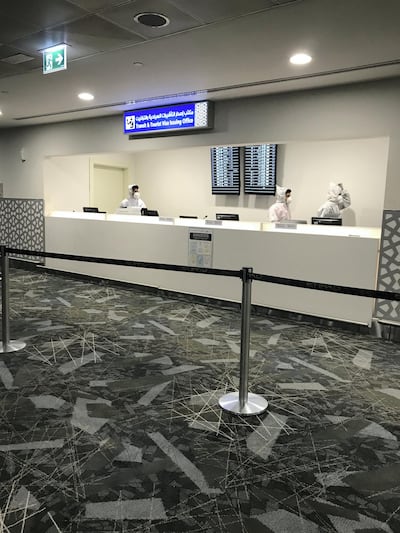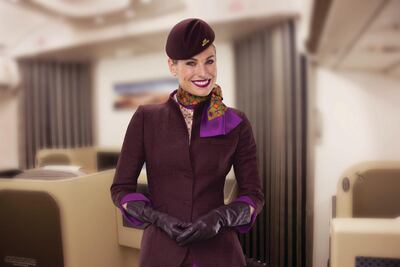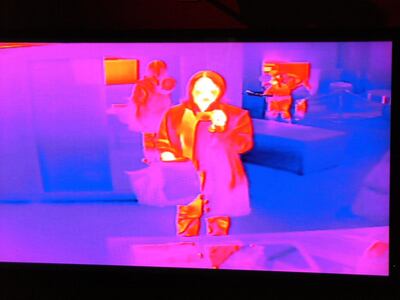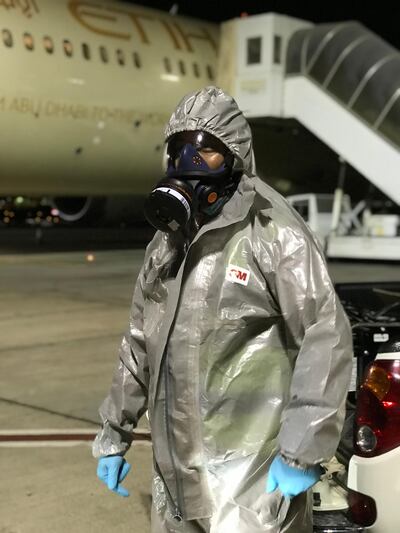It’s hard to catch everything that the nurse standing on the tarmac is saying over the incredible din of the Etihad Dreamliner rolling to a stop a few metres ahead of her.
The protective face mask she's wearing over her mouth and nose muffles her words further as flight EY405, fresh in from Bangkok, shuts down its engines.
“It’s hard when I leave work to stop thinking about it,” she says. “I’m always thinking about it.”
As one of the medical response team at Abu Dhabi International Airport, it’s understandable why coronavirus is on her mind. This nurse is one of the people on the front line in helping limit the spread of Covid-19 in the UAE.
Dressed in blue scrubs, a face mask, hair net and shoe protectors, she joins her colleague to ascend the air-stairs stretching towards the Boeing jet.
Having landed in Abu Dhabi from Thailand, a place considered high-risk in the coronavirus crisis, passengers on this aircraft are set for some rigorous safety checks.
Since the outset of the outbreak of Covid-19, authorities at the airport have been testing all passengers landing in the country from high-risk destinations. “So far we’ve tested over 15,000 people on arrival at Abu Dhabi Airport, and we haven’t had one positive return as yet,” Bryan Thompson, CEO at Abu Dhabi Airports says (as of Wednesday, March 18).
Temperature scans on the plane
Before they get to the nasal swabbing, medical testing begins with the nurses who wait on the tarmac, ready to screen every passenger on high-risk flights with a hand-held digital thermal scanner and thermometer. At any sign of fever, the ambulance parked underneath the jet will transport the passenger straight to an isolation room for more testing.
Tonight, it’s all clear and the nurses return to the safety of the tarmac as the passengers disembark on to buses: each bus has been entirely sterilised since it was last operated.
Hazmat suits and gas masks
With the passengers gone, aircraft cleaning can begin. Dressed head to toe in a silver hazmat suit and sealed gas mask, one of the crew heads into the jet with a bacoban-filled canister on his back. This chemical can kill the coronavirus – protecting surfaces for up to ten days after each spray.
Ever since the outbreak of Covid-19, every aircraft landing at Abu Dhabi Airport has been carefully sprayed with the chemical. These methods are just one part of the web of procedures now in place to protect travellers, airport staff and the UAE community from the spread of Covid-19.
“We’ve taken great measure to protect both passengers and staff since the inception of all of the knowledge coming out of China with regards to how the virus is being spread,” explains Bryan Thompson, CEO of Abu Dhabi Airports.
“We’ve been very fortunate at a national level that there has been great control, right from the beginning. We’ve been kept well informed as to how the disease is spreading and what our role is in protecting Abu Dhabi and the UAE from allowing the disease to enter or spread across the emirates,” he explains.
As the situation has evolved, Thompson has been juggling many elements. “We’ve seen a dramatic impact on our flights and had a huge traffic reduction in and through Abu Dhabi," he says.
As the passenger demand for air travel has dropped, the airport has cut its capacity from three terminals to one main terminal. Almost all flights are now operating from Terminal 3.
Inside that terminal tonight, passengers from the Bangkok flight are splitting into two groups.
What to expect if you're in transit: Red means heat. In this battle, heat isn’t good
The first group are transit passengers who enter a security screening hall where they immediately pass by an airport employee positioned carefully behind two thermal scanners.
On a screen in front of him are ghostlike silhouettes of each passenger as they move before the camera lens. Facial features aren’t visible, neither is hair colour or what anyone is wearing. The employee watches the moving shapes intently, barely glancing up at passengers in real life, until he spots a hint of red on his monitor.
Red means heat. In this battle, heat isn’t good.
He calls to the couple in front of him. A young red-headed girl and her baseball cap wearing partner. They look worried.
The sensor has picked up trace levels of heat around the man’s neck. The airport staff take a digital thermometer and place it in his ear. It reads 36.8 degrees: normal. The couple can go – they hurry along. For transit passengers – unless they have any specific symptoms or are feeling unwell – that’s the extent of the checks.
What happens if you're staying in Abu Dhabi

For travellers entering the country, it is a different process. Tonight’s second group of passengers are staying in Abu Dhabi so before they can leave the airport, there’s secondary testing to be carried out. In the medical room – fashioned out of what was previously a disruption area used when flights were cancelled – about 14 passengers are lining up.
The low number of travellers isn’t uncommon anywhere now – passenger figures have been low since the crisis broke. A combination of fear over the virus, travel advisories and logistical difficulties are keeping passenger numbers down.
“Some of the complexities of this situation is that it can change very quickly,” explains Thompson.
“That means passengers are getting caught at hub airports, en route to another destination, that has since closed down. It’s a situation that’s becoming increasingly complex to manage, but we have a very good communication platform set up between ourselves and Etihad. We speak to them regularly so they can update passengers and tell them not to board an aircraft if there’s a risk that’s going to happen.”
Passengers from tonight's Bangkok flight are a mixed bag. There’s an Emirati man in a wheelchair travelling with a younger family member and a European-looking male smartly dressed in a sports jacket. Tanned younger couples and a few casually dressed holidaymakers in shorts and sandals make up the remainder.
Nasal swabs and thermal scans

Inside the medical testing area, the travellers register at a desk manned by a team wearing face masks and white body suits. Each passenger registers in the system, a process that takes around 45 seconds.
Walter Ballesteros completes registration and is handed a plastic wallet containing a swab stick. The American is heading home to the US after nearly two months in Thailand, but stopping in Abu Dhabi first. He explains that his flight from Bangkok was busier than expected.
“The flight was good, but it wasn’t as empty as I thought it would be. I guess they’ve put a lot of people on to it that had other flights cancelled.”
With several airlines around the globe having cancelled flights to countless destinations, he’s probably correct.
“We’re only in Abu Dhabi for one night, trying to get home. It’s a strange time to travel, the situation was on my mind the whole flight,” he says before taking a seat in the testing room.
Here, a nurse explains to him exactly what she will do to complete the test for Covid-19.
'Testing is the key to keeping this under control'
For the CEO of Abu Dhabi airports, this step is critical. “Testing is the key to keeping this under control,” he says. “There’s been no limit set on how many tests we can do. Test kits get provided to us on a daily basis, and we’ve never got to a stage where we’ve run out of kits so we’re able to do as many tests as we require.”
Heather Allman is travelling to Chicago. Her original travel plan was to fly home via a stop in Paris, where she has some items stored at a friend's house. Since the airline that she was booked to fly with cancelled all flights out of Thailand, Allman's things will need to remain where they are a little longer and she now has an out of the blue stay in Abu Dhabi. She also takes the test, but reveals that it was unexpected.
“They [the airline] didn’t tell us we were going to have these tests, the swab itself is a bit intense. But I don’t mind. In a way, it’s reassuring to have it as at least I know if it’s clear then I don’t have to worry about it,” she says.
On her way home, Allman has bittersweet feelings about her return journey but believes that “the more grace we all give the entire situation now, the better.”
“I’m looking forward to getting back to family, but not really to going back home. My partner and I want to get back as we know many people in the US are going to struggle with basic things – medical care, access to fresh food. We’re both very community aware and food conscious – that’s what we’re headed back to try to help with,” she explains.
Crew testing
Inside the medical room, it's not just the passengers who are tested. Several Etihad crew members have joined those lining up for nasal swabbing. One pilot spots The National's cameraman hovering and grows concerned.

“Why are we taking pictures? I don’t want my picture taken,” he says. He’s reassured that while nasal swabbing is compulsory, having his picture taken is not. He’s just flown seven hours from a high-risk destination in a time when the aviation industry is facing a situation that the CEO of Abu Dhabi Airports describes as “unprecedented.”
It’s also not his first swab. Nor is it likely to be his last. Crew must be tested every time they fly in from a country that is considered to have a high rate of infection.
14 day self-isolation
Nasal swab results typically come back in 24 hours, but can take up to four days. A self-isolation period has been set for any travellers coming into the UAE who must quarantine for 14 days. This does not apply to transit passengers.
Across the country, authorities have closed down tourist attractions, public beaches, bars, nightclubs, cinemas and more. As well as limiting social interaction, this also helps remove temptation for travellers that might break these self isolation rules.
Any positive result that comes through during this time-frame would result in a traveller receiving treatment to manage the disease.
Once travellers have completed nasal swabs in the airport, they are free to leave via a final check in front of another thermal scanner, just like those in place for transit passengers. Any temperature peak highlighted here calls for further examination.

As the situation continues to evolve, authorities at the airport have contingency plans in place and are talking to authorities about extending testing to all passengers, rather than only those coming from what are considered high-risk destinations.
“For now we continue to be very much on the front line and we’re doing as much as we can to make sure we play our part on the national level.
"We’ll go to the eighth degree to continue to make travelling in or through Abu Dhabi airport a safe experience for all," concludes Thompson.





























